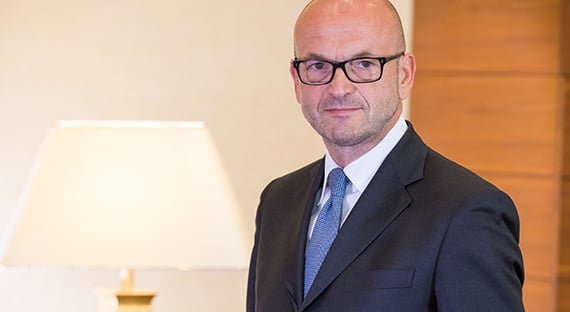
Boštjan Jazbec, the governor of the Bank of Slovenia since 2013 (photo: Dean Tošovic)
Our first interview features Octavian Armasu, Moldova’s Minister of Finance, and Sergiu Cioclea, Governor of the National Bank of Moldova. Watch out for next week’s interview with Martina Dalić, Croatia’s Deputy Prime Minister and Minister of Economy.
Slovenia's Central Bank Governor: Institutions Are the People Who Govern Them
September 12, 2017
After addressing from its own coffers a looming banking crisis in 2013, which threatened to bankrupt the state, Slovenia has regained its footing and its economy has been growing for the past four years. We sat down with Boštjan Jazbec, the governor of the Bank of Slovenia to discuss the challenges still facing the country.
Slovenia was one of the ten countries who joined the EU in 2004, and was expected to make big strides in convergence to the rest of Europe. Where is Slovenia in the process?
For us, it was a natural and logical step to join the EU in 2004 and we were one of the first countries that fulfilled all the requirements needed for accession. Slovenia is an export oriented country, therefore the EU, and, later on, the adoption of the euro provided the anchors to help us weather the rather difficult financial crisis.
Slovenia was in a much better situation than some other transition economies because we were better developed. But it is also a curse for Slovenia in many ways because we became complacent and did not strive for reforms, which other countries, that had to be more radical, carried out.
Some would say we tried to find our own way: in Slovenia, a substantial part of the economy is still state owned. During our financial crisis in 2013 we tried to retain control over these state-owned banks. In many cases, we failed, which cost us, and, unfortunately also the taxpayers, €4.8 billion.
This experience will hopefully boil down to better governance, so that the society at large will benefit.
Can better institutions—the rule of law, but also the network of various organizations that allow a country to function properly—help Slovenia and other countries in the region catch up faster with their western European peers?
We can probably discuss from the right historical distance our convergence path now, 25 years after the independence, which triggered massive changes not only politically, but also economically. We all started out with massive privatizations, liberalizations, and putting market first. But then, in my view, we forgot something very important: to overhaul our institutions. My belief is that institutions are nothing but people who govern them. Something that markets cannot bring. And I think we can still observe an ongoing cultural change in their governance and public perception. That is necessary for this part of Europe to finally catch up.
Slovenia was the first of the ten countries joining the EU in 2004 to join the euro area in 2007. What is your takeaway of this decade within the currency zone?
The euro for Slovenia represents an anchor, in terms of macroeconomic stability. I do not believe that small, open economies can run independent monetary policy. Being one of the most trade-integrated European economies helped us deal with exchange rate risks that go with running your own monetary policy. For that reason, the euro was beneficial for the development of Slovenia.
But while euro adoption exactly a decade ago meant a strong push to the economy, it also generated some unexpected problems in terms of credit growth and the excessive leverage of Slovenian corporates.
Some would claim that being a small country in a big club means we are sitting in the shadow of the big players. But my experience is rather opposite. Being a member of the governing council of the European Central Bank (ECB) gives me the opportunity to express the views of the small ones—which at the end of the day are not so much different than the views of the big ones. But this makes the discussions in the governing council of the ECB interesting, lively, and very productive.
Despite the need for the bank bailout, Slovenia did not resort to an IMF program, but financed itself from the markets. How do you see the role of international organizations in the economic field?
The IMF, in my view, presents a sounding board, an enormous community of different views, reduced at the end of the day to some simple advice and guideline for governments either to embrace or try to find their own ways. In Slovenia, we have had our differences with the IMF. But the IMF was there as a benchmark of what was happening in other countries, a very practical and useful way of learning from the mistakes of the others, and then hoping that you are not repeating them at home.


